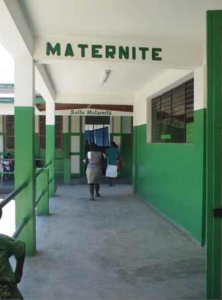 By Jenny Asarnow July 13, 2011Coman Language Project:
By Jenny Asarnow July 13, 2011Coman Language Project:
I came to Haiti to find out why women and babies here are 50 times more likely to die during childbirth than Americans, and to find out how nurse-midwives are working to save their lives.
I spent much of my time at the public hospital in Hinche, a small city in Haiti’s rural Central Plateau. This is the regional hospital, and the sickest people come here from hours away by foot, or on the tops of supply trucks, or on motorcycles. The hospital is always crowded.
Women about to give birth, like Christianne Lenay, have to bring their own sheets and a bucket for a chamber pot. They also have to buy their own food. They get free care, but supplies are often unavailable, and nurses send patients or their family members into town to buy pills and even IV bags. Nurses don’t do rounds at night, and don’t have time for kind words and regular checkups. Patients’ rooms are open to the air — and the mosquitoes and flies and lizards that come through. Dogs turn over trash cans in the courtyard at night.
That’s not to say it’s worse than any other hospital without enough supplies and staff. It’s pretty clean, especially for a place with sporadic running water. And many of the nurses skillfully care for sick patients whose conditions are complicated by hunger, dehydration and anemia — the side effects of poverty. Eighty percent of Haitians live on less than $2 a day. Life expectancy here is 62 years. This hospital and others like it mean the difference between life and death for many people.
But when I got sick, I knew one thing for sure: I was not going to that hospital.
* * *
One morning into my second week in Haiti I woke up sick. I feared cholera, which UN workers accidentally introduced to Haiti after the earthquake last year. Its symptoms are diarrhea, vomiting and fever.
I was scared and decided to travel with a friend three hours to Port-au-Prince, to the best hospital money can buy in Haiti (or so I’d heard): Canape Vert.
I was severely dehydrated by the time we got to the hospital. The man who greeted us asked, “Are you looking for the emergency room? There’s no emergency room here.”
“I’d just like to see a doctor,” I said.
“There’s no doctor here.”
“Or a nurse?”
We were told to wait, which we did, in an empty waiting room. The nurses ignored us.
A foreign doctor walked by.
“Do you need help?”
He directed us back to where we came in. A man was sitting behind a desk.
“So you want a room?” he asked.
“I want to see a doctor.”
“Well you’re going to have to get a room.”
He showed me a large ledger, filled with many columns and rows and numbers and quoted a very reasonable sounding price.
“Perfect,” I said.
“That room has no air conditioning and a shared bath.”
My friend jumped in.
“She wants air conditioning.”
“Wonderful,” said our host. “We have rooms with air conditioning. Would you be needing an extra room with a couch?”
“No, that won’t be necessary. Just the cheapest room with a private bath and air conditioning.”
He made himself busy.
“I’m sorry, we don’t have any room of that sort. What do you say — how about a suite with a couch?”
“Look, monsieur,” I said, “I’m very, very sick. I need to see a doctor. Please just put me in whatever room you have available.”
He nodded, serious.
“That will be $120 U.S. a night.”
So for the price of a luxury hotel room in Port-au-Prince, I was admitted for care.
I dragged myself back up the stairs. Now the nurses were sweet as sugar. They settled me in and started an IV drip.
I was treated like a princess. My blood, urine and feces were thoroughly analyzed. One person cleaned my room several times per day. Another changed my sheets. Nurses checked my IV at all hours of the day and night. A sweet older woman brought me food and pursed her lips if I didn’t finish it.
I got excellent care but it turned out I didn’t need much of it. I didn’t have cholera; I just had traveler’s diarrhea. Standard stuff.
* * *
When I’d first arrived I had noticed several soldiers guarding the room next to mine. The next morning I heard cheers outside. My neighbor was gone.
My friend asked a nurse who it was. “Le president!” she said. Not exactly — it was Haiti’s ex-dictator, “Baby Doc” Duvalier.
My other neighbor was the Sorbonne-educated biochemist and famous Voodoo priest Max Beauvoir.
I was in the company of celebrities, getting what most people here never have access to: skilled, comforting and attentive care.
I jetted off to the capital for five-star treatment of traveler’s diarrhea, while Haitians from the Central Plateau can barely afford to get care in an overcrowded, understaffed and understocked public hospital.
It’s unfair, and heartbreaking, and I know I’d do it again.
I paid $700 cash and left two days after I arrived. The average Haitian hustles to make $450 per year. For the cost of an IV drip and a room, I paid one and a half times most Haitians’ annual income. When I stopped to think about it, it made me feel sicker than the traveler’s diarrhea.
Jenny Asarnow reported from Haiti as a fellow with the International Reporting Project, an independent journalism program in Washington, D.C.